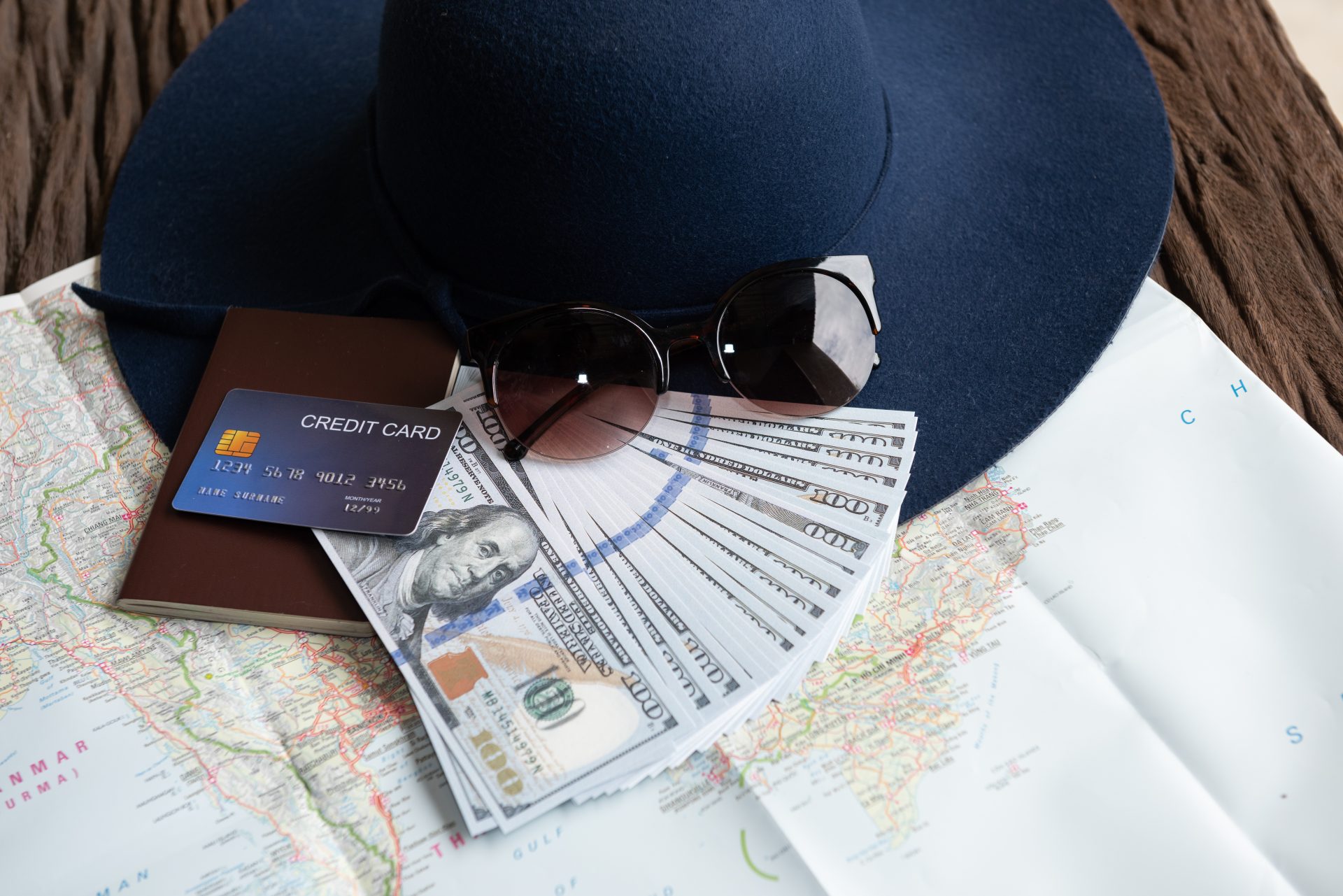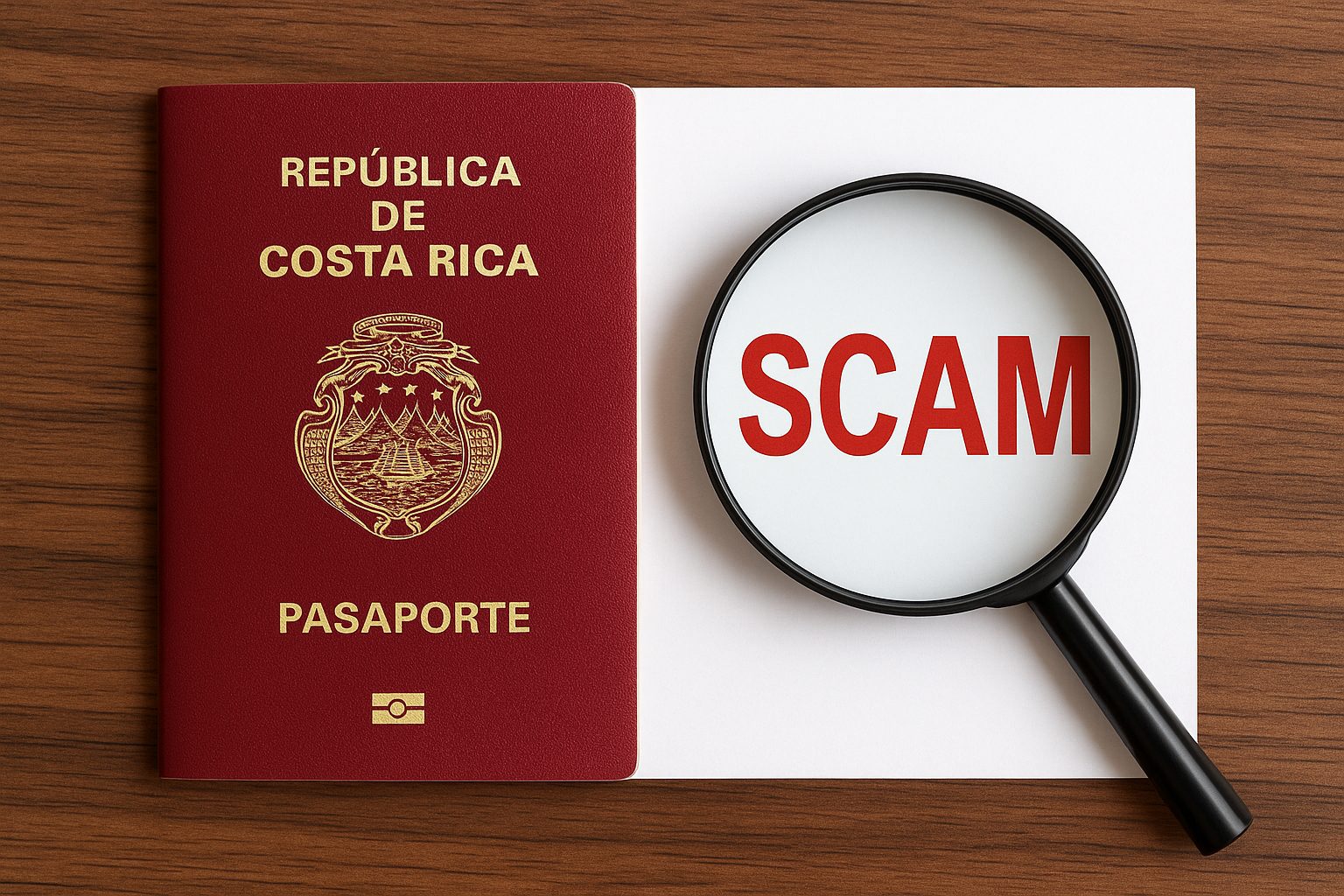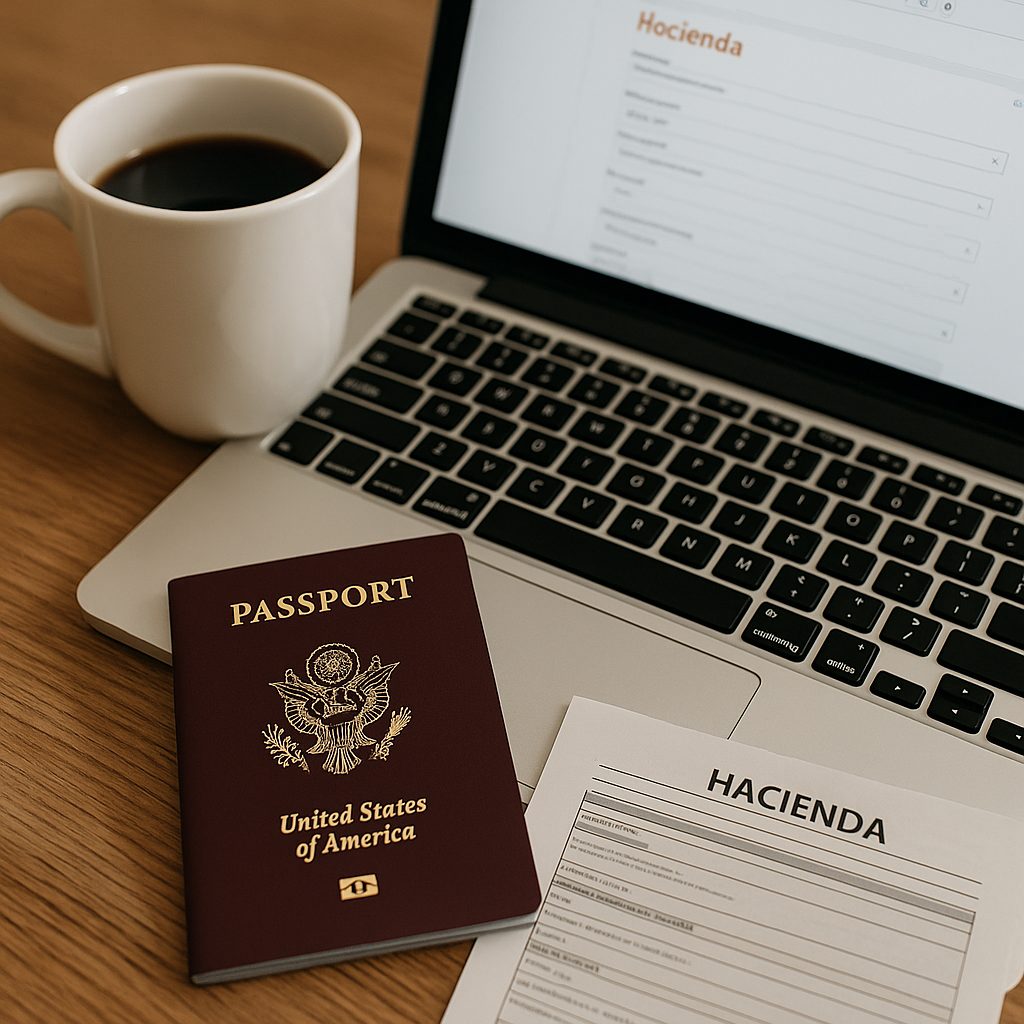Myths, exaggerations and hidden sales What Immigration Does Not Ask You For (even though many want you to believe they do) A …

What's New?
main categories of residence Types of Legal Residency in Costa Rica Temporary, Special, or Permanent? Find out what suits you best. Now …
What to know before paying for emigration to Costa Rica Warning Signs and Useful Tips Costa Rica is attracting more and more …
What you should know before believing internet promises Work visas for Costa Rica directly from your Country? How to legally arrive in …
in Costa Rica How I Registered a Tourist Activity in Costa Rica for someone from the USA – legally, quickly and without …
What's New?
Myths, exaggerations and hidden sales What Immigration Does Not Ask You For (even though many want you to believe they do) A …
main categories of residence Types of Legal Residency in Costa Rica Temporary, Special, or Permanent? Find out what suits you best. Now …
What to know before paying for emigration to Costa Rica Warning Signs and Useful Tips Costa Rica is attracting more and more …
What you should know before believing internet promises Work visas for Costa Rica directly from your Country? How to legally arrive in …
in Costa Rica How I Registered a Tourist Activity in Costa Rica for someone from the USA – legally, quickly and without …
What's New?
Myths, exaggerations and hidden sales What Immigration Does Not Ask You For (even though many want you to believe they do) A …
main categories of residence Types of Legal Residency in Costa Rica Temporary, Special, or Permanent? Find out what suits you best. Now …
What to know before paying for emigration to Costa Rica Warning Signs and Useful Tips Costa Rica is attracting more and more …
What you should know before believing internet promises Work visas for Costa Rica directly from your Country? How to legally arrive in …
in Costa Rica How I Registered a Tourist Activity in Costa Rica for someone from the USA – legally, quickly and without …
Which Residency Category Is Right for You?
A Guide by Category – Straightforward and Clear Explanations
Instead of repeating the same generic information, I decided to explain each residency category clearly, without legal jargon, and using real-life examples.
The purpose of this guide is to help you correctly identify which category applies to you — and to understand whether or not it is the right fit for your situation.
If, after reading this article, you still have specific questions related to your particular case — I’m available to help, within the limits of my available time.
General Requirements
If you intend to live in Costa Rica, you must apply for an immigration category that best suits your living conditions or personal needs. Below are the requirements for regularization.
A request for legal residency, indicating the applicant’s immigration status, intention, current address, and the preferred method for receiving official notifications. This request must be signed either in front of a public official at the Services Platform or the corresponding regional administrative office, or with a properly notarized signature by a licensed attorney.
1. Two recent passport-style photos, showing your full face.
2. Birth certificate, issued in your home country, properly legalized and authenticated or apostilled.
The birth certificate is valid even if issued more than six months ago, as long as it’s translated into Spanish by an official Costa Rican translator and legalized or apostilled by the Ministry of Foreign Affairs, the information matches your passport, and the document is in perfect condition (no erasures, stains, corrections, tears, tape, or anything that could raise doubts about its authenticity).
If there are any differences between your passport and birth certificate, you’ll be asked to explain them either by providing supporting documents or corrected versions.
3. Criminal record certificate from your home country or from any country where you’ve legally lived in the past three years, properly legalized and authenticated or apostilled.
You’ll also need to prove your legal stay in that country during that time by providing a certified copy of your immigration document.
4. If you’re from Mexico, Brazil, the USA, Canada, or other countries with both local and federal courts, you’ll need criminal record certificates that check your name, ID number, and fingerprints (where available) to confirm you have no criminal record anywhere in your home country or the country where you lived legally for the last three years.
If the federal certificate mentions arrests or ongoing cases, you’ll also have to provide the local criminal record from the place where the case is processed, showing the case’s outcome.
5. Copies of the passport pages with your personal info, the Costa Rica entry stamp, and your entry visa (if your nationality requires one).
These must be notarized or verified in person by a migration officer where you apply.
6. To prove financial solvency, any of these documents can be accepted:
- A valid work order or letters from your employers, on company letterhead with a stamp, stating your gross and net salary, years of work, and your job title.
- For retirees, receipts or certificates from the authorities showing your pension amount and period.
- For students, a certificate from a licensed accountant explaining your financial support. If you have a scholarship, provide an official letter detailing the amount, duration, and covered expenses.
- A certificate from a licensed accountant detailing your income and expenses, or audited financial statements for businesses, for the last fiscal year. Migration authorities may request the full file behind these certifications if needed.
- A copy of your volunteer program details, including how it’s funded.
- If your studies or volunteer work are funded from other sources, provide the relevant documents.
- If you can’t provide any of the above, you can submit a sworn statement explaining why, confirming you have enough resources and their origin. Authorities reserve the right to verify your statement. For minors or dependents, the statement must come from the person responsible for covering their expenses.
7. Proof of consular registration
You must submit a certificate or confirmation showing you’re registered with your country’s consulate, valid and recently issued. This proves that your country’s diplomatic mission in Costa Rica recognizes and has you on record.
⚠️ Usually, you can get this document on request from your embassy or consulate in San José. If your country doesn’t have a diplomatic office here, there may be alternative procedures or exemptions, but it’s best to check with the Migration Office directly.

Important Notes
- Proof of fingerprinting must be presented at the time of submitting your documents. This requirement does not apply to temporary workers or individuals belonging to indigenous communities.
- Any application to obtain legal residency status that involves a change of category from non-resident to any category established by law must be accompanied by proof of payment of $200 USD (or the equivalent in Costa Rican colones, based on the reference exchange rate of the Central Bank of Costa Rica – BCCR).
The payment must be made to account no. 242480-0 at Banco de Costa Rica, under the name of the applicant (the foreign person applying).
- Any document that was not originally issued in Spanish must be accompanied by a literal translation into Spanish, carried out by an official translator or a notary public who is fluent in the source language.
- Any public document issued outside of Costa Rica must either be:
- Apostilled, if the issuing country is a member of the Hague Apostille Convention, or
- Legalized by the Costa Rican consulate in the issuing country, and then authenticated by the Ministry of Foreign Affairs and Worship in Costa Rica.
- If the birth certificate issued by the country of origin does not include the parents’ names, the applicant must submit a notarized sworn statement that includes this information, along with the birth certificate itself.
Who can apply for Permanent Residency?
- Individuals with temporary residency, who have renewed their residency document for three consecutive years.
- The spouse of a Costa Rican citizen, holding temporary residency, who has proven continuous cohabitation and renewed their immigration status each year for three years.
- Individuals who have been granted refugee, asylum, or stateless status, and have held this status for at least three years.
Applying for permanent residency does not require giving up refugee status unless the applicant expressly declares it.
- Request Letter, which must include the following details:
- Full name of the applicant
- Case file number (expediente)
- DIMEX number
- Nationality
- Age
- Occupation
- Residential address
- Parents’ full names
- Contact details for notifications (email / phone number)
In the section stating the reason for the request, the following must also be included (if applicable):
- Full name of the Costa Rican citizen to whom the applicant is related
- Their Costa Rican ID number (cédula)
The letter can be signed in front of an officer at the Migration office.
2. Proof of payment of $200 USD (or the equivalent in colones at the official BCCR exchange rate) for the change of immigration category.
Payment must be made to the following account:
#242480-0 – Banco de Costa Rica, under the name of the applicant.
3. Proof of payment of $50 USD (or the equivalent in colones), made to the same account and under the same name.
⚠️ This payment is not required when changing from temporary to permanent residency.
4. If the applicant holds temporary residency under the rentista category (independent income resident) and wishes to change category:
- In addition to the above, the applicant must request the release of the funds from the fixed, permanent monthly income that was used to obtain residency, if the money was deposited in a Costa Rican state bank.
Stay for Non-Residents
Requirements:
- A request letter from the interested person, stating the reasons for requesting to stay in Costa Rica under this subcategory, including their exact residential address and contact details for notifications.
- Proof of payment to the Government of $100 USD (or the equivalent in colones, according to the Central Bank’s reference exchange rate), in accordance with Article 256 of the Law.
- Certified copy or verified original of all valid passport pages.
- Two recent passport-style photos.
- Fingerprinting certificate issued by the Ministry of Public Security.
- Proof of consular registration.
- A letter issued by one of the branches of government, a public or private institution, university, or college, explaining the reasons for the requested stay in the country.
- If invited to participate as an arbitrator, lawyer, witness, expert, or technical staff in an international arbitration process based in Costa Rica, in addition to the above requirements, a certificate issued by the competent authority in the country of origin must be provided. This certificate should confirm that the person is registered and authorized to perform this role, specifying the period and involved states. If issued abroad, the document must be legalized and authenticated or apostilled according to legal requirements.
In addition to the documents listed above, the person must also submit:
- Birth certificate
- Criminal record certificate
Both documents must be properly legalized and authenticated or apostilled.
To apply under this subcategory of stay, the applicant must submit the following documents:
- A personal request letter stating the reasons for requesting to stay in Costa Rica under this subcategory, including an exact residential address and a means of contact for official notifications.
- Proof of payment to the Government of $100 USD (or the equivalent in colones, according to the Central Bank’s reference exchange rate), in accordance with Article 256 of the Law.
- Certified copy or original-verified copy of all pages of the applicant’s valid passport.
- Two recent passport-style photographs.
- Fingerprinting certificate issued by the Ministry of Public Security (Ministerio de Seguridad Pública).
- Proof of consular registration (comprobante de inscripción consular).
- A letter issued by the company or organization to which the applicant belongs, clearly stating the duties they will carry out in Costa Rica, and confirming that they will not receive any salary or fees within the country.
Required Documents:
- A personal request letter explaining the reason for requesting to stay in Costa Rica under this subcategory, including an exact residential address and contact information for official notifications.
- Proof of payment to the Government of $100 USD (or the equivalent in colones, according to the official exchange rate set by the Central Bank), in accordance with Article 256 of the Law.
- Certified copy or original-verified copy of all pages of the applicant’s valid passport.
- Two recent passport-size photographs.
- Fingerprinting certificate issued by the Ministry of Public Security.
- Proof of consular registration.
- Certificate issued by the hospital or medical center (public or private) where the treatment will take place.
The institution must be officially authorized to operate by the Ministry of Health, in accordance with Article 2, paragraph 26), and Annex 3, for units of type A, B, or C, as outlined in the General Regulation for the Issuance of Operating Permits (Executive Decree No. 34728-S). - Medical report indicating the patient’s current condition and the estimated duration of the treatment.
- Official proof that the applicant has sufficient financial means to support their stay and medical expenses.
- If the treatment is expected to last longer than six months, the applicant must also submit:
- Birth certificate, and
- Criminal record certificate
Both must be properly legalized and authenticated or apostilled.
If the patient’s physical condition makes it impossible to obtain these documents, a sworn statement may be submitted in which the person declares the relevant birth and criminal record information.

Conclusion – What Comes Next
Which Residency Category Is Right for You?
Each legal residency category in Costa Rica comes with its own requirements, benefits, and limitations. There is no such thing as a “perfect option” that fits everyone — but there is one that suits you, based on your current situation and your future plans.
It’s crucial to understand what each option involves before making a decision — especially if you’re coming with your family, planning to work legally, or thinking of starting a business. In Costa Rica, administrative mistakes are costly: they will cost you time, money, and nerves.
If you’re unsure or don’t clearly fit into any category, maybe now is not the right time to apply. It might be better to take a step back, dig deeper into your research — or even plan a short-term visit as a tourist first.

This was Chapter 1 of our series on residency in Costa Rica, where we covered the documents required to apply legally, based on your personal situation — whether it’s for medical treatment, business, official invitations, or other legally accepted reasons. Each subcategory has its own requirements, but all share the same goal: to clearly prove why you’re here, who you are, and that you can support your stay.
In Chapter 2, we’ll dive into the main categories of temporary, special, and permanent residency — for retirees, investors, people with family ties to Costa Rican citizens or residents, students, and many others.
Chapter 3 will be dedicated to digital nomads, a recently introduced category with specific rules and benefits for those who work remotely.
Finally, Chapter 4 will explain the conditions and steps for obtaining Costa Rican citizenship, whether through naturalization, marriage, or birth.
Stay with us, because the information in the next articles is essential if you want to make an informed, realistic, and legal decision about life in Costa Rica.





